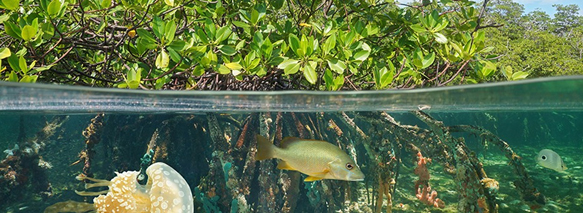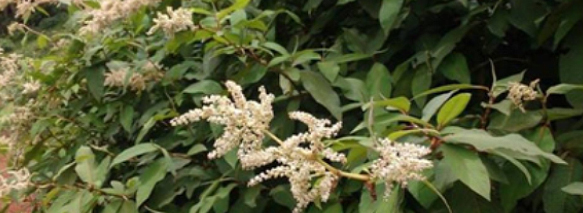Prelim Snippets 27-07-2019
International Day for the Conservation of the Mangrove Ecosystem

- The International Day for the Conservation of the Mangrove Ecosystem was adopted by the General Conference of UNESCO in 2015.
- Since then it is celebrated each year on 26 July.
- It aims to raise awareness of the importance of mangrove ecosystems as “a unique, special and vulnerable ecosystem”
- It promotes solutions for their sustainable management, conservation and useswhile advancing the sustainable development of their local communities.
About Mangroves:
- Mangroves are rare, spectacular and prolific ecosystems on the boundary between land and sea.
- These extra ordinary ecosystems contribute to the wellbeing, food security, and protection of coastal communities worldwide.
- They support a rich biodiversity and provide a valuable nursery habitat for fish and crustaceans.
- Mangroves also act as a form of natural coastal defense against storm surges, tsunamis, rising sea levels and erosion. Their soils are highly effective carbon sinks, sequestering vast amounts of carbon.
- In India Mangrove ecosystem is found in the coastal States/UTs of West Bengal, Gujarat, Andaman & Nicobar Islands (Top three in terms of area), Andhra Pradesh, Maharashtra, Odisha, Tamil Nadu, Goa, Kerala and Karnataka.
Koenigiamollis – Sikkim Knotweed

Context: These knotweeds native to the Himalayas have invaded into the Nilgiris and are posing a threat to this ecosystem.
- The knotweed, known as Polygonum mole (Sikkim knotweed), which has been recently reclassified as Koenigiamollis, has begun spreading along many streams and rivulets in the upper Nilgiris, especially around Doddabetta, Kodappamund, Adasolai and the Ketti Valley.
- A native inhabitant of the Himalayas, the plant has spread to the Nilgiris only over the last couple of decades, the rate at which they seem to be spreading in the district is a matter of serious concern.
- The knotweed was among 27 different species of invasive flora identified by conservationists which pose a threat to native landscapes and biodiversity in the Western Ghats
- These plants typically grow along the sides of streams and rivers, they seem to also now be spreading to the sides of the road, meaning they can be even more quickly spread to other locations.
- As the knotweed grows, it can cover huge expanses of land, leaving little to no space for other native plant species to grow.
- Conservationists believe that the knotweed could have been brought to the Nilgiris by visitors and accidentally released into the landscape.
UN-SPIDER
Context: India received satellite data related to floods in different regions of the country from eight nations including US, Russia, and China, due to its membership of the International Charter Space and Major Disasters, which has been set up under the UN-SPIDER.
About UN-SPIDER:
- United Nations Platform for Space-based Information for Disaster Management and Emergency Response (UN-SPIDER)is a platform which facilitates the use of space-based technologies for disaster management and emergency response.
- It is a programme under the auspices of the United Nations Office for Outer Space Affairs (UNOOSA).
- UN-SPIDER ensures that all countries and international and regional organizations have access to and develop the capacity to use all types of space-based information to support the full disaster management cycle.
About United Nations Office for Outer Space Affairs (UNOOSA):
- The United Nations Office for Outer Space Affairs (UNOOSA) works to promote international cooperation in the peaceful use and exploration of space, and in the utilisation of space science and technology for sustainable economic and social development.
- The Office assists any United Nations Member States to establish legal and regulatory frameworks to govern space activities and strengthens the capacity of developing countries to use space science technology and applications for development by helping to integrate space capabilities into national development programmes.
Fast Fashion
Context: The term ‘fast fashion’ has increasingly been in the news due to its large-scale impact on the environment.
- Fast fashion refers to clothing that is mass-produced inexpensively, coming straight from the factories to deliver the newest trends to consumers at low prices.
- The defining characteristic of fast fashion is its affordability, and in recent years, major fast fashion retailers have set up major businesses in India.
- According to a McKinsey report, the lowest-priced fast fashion garments may be discarded after being worn just seven or eight timesresulting in a vast increase in the amount of waste generated by the fashion industry.
- After oil, fashion is the world’s second-most polluting industry. And as the scale of production grows, so does the scale of pollution.
- In 2015, the clothing industry was responsible for 1.714 billion metric tonnes of carbon dioxide emissions, and used 141 billion cubic metres of water.
- Water-dyeing textiles have resulted in the industry also being the second-largest polluter of clean sources of water globally, after agriculture.
National Council for Teacher Education
Context: The National Council for Teacher Education has begun the process of weeding out substandard teacher training colleges, as recommended in the draft National Education Policy.
About NCTE:
- It is a statutory body functioning autonomously under the Ministry of Human Resource Development (MHRD)
- It was set up in 1995 under National Council Teacher Education Act, 1993.
- Its secretariat is located in the Department of Teacher Education and National Council of Educational Research and Training (NCERT).
Objectives & Functions:
- Achieve planned and coordinated development of teacher education system throughout the country.
- Regulate and properly maintain the Norms and Standards in the teacher education system and for matters connected there with.
- It aims at training individuals for equipping them to teach pre-primary, primary, secondary and senior secondary stages in schools, non-formal and part-time education, adult education (correspondence) and distance education courses.
- It makes recommendations to both the state and central governments, universities, University Grants Commission (UGC), and other recognised institutions.
- It lays down the guideline for the minimum qualifications need for an individual to be a teacher in schools and recognised institutions.
Malabar River Festival
Context: The seventh edition of the Malabar River Festival featuring the International White-Water Kayaking Championship kicked off at Pulikkayam near Kodencheri in Kozhikode, Kerala.
- The festival is rated as one of the best Kayaking Championships in Asia with the highest price money in the world, $1 million.
- It has participants from around nine countries.
- The event is organised by the Kerala Adventure Tourism Promotion Society and Kozhikode District Tourism Promotion Council with the technical support of Madras Fun Tools.
- The event has been included in the International Canoe Federation calendar this year, has been recognised by the Indian Kayaking and Canoeing Association.
About Kayaking:
- Kayaking is the use of a kayak for moving across water.
- A kayak is a low-to-the-water, canoe-like boat in which the paddler sits facing forward, legs in front, using a double-bladed paddle to pull front-to-back on one side and then the other in rotation






